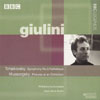Tchaikovsky Symphony 6 & Mussorgsky Pictures
Classic Giulini - the subject of this month's 'Reputations' (page 38) - in two Russian masterpieces, both central to his repertoire
View record and artist detailsRecord and Artist Details
Composer or Director: Modest Mussorgsky, Pyotr Ilyich Tchaikovsky
Label: BBC Music Legends/IMG Artists
Magazine Review Date: 3/2000
Media Format: CD or Download
Media Runtime: 76
Mastering:
ADD
Catalogue Number: BBCL4023-2

Tracks:
| Composition | Artist Credit |
|---|---|
| Pictures at an Exhibition |
Modest Mussorgsky, Composer
Carlo Maria Giulini, Conductor Modest Mussorgsky, Composer Philharmonia Orchestra |
| Symphony No. 6, 'Pathétique' |
Pyotr Ilyich Tchaikovsky, Composer
Carlo Maria Giulini, Conductor Philharmonia Orchestra Pyotr Ilyich Tchaikovsky, Composer |
Author: Ivan March
These BBC mono recordings, made in the Usher Hall, are on the dry side, but well balanced, full and certainly brilliant, so we can enjoy vital, un-doubtedly distinguished and extremely well-played performances as a concert experience. Alas, the audience is never quite silent and the beginnings of movements are especially prone to rustling noises, although there are no really disastrous intrusions.
The Philharmonia is clearly on good form and the vivid characterisation of each of Mussorgsky's Pictures brings many inimitable touches. Giulini's diminuendo at the end of the second 'Promenade', for instance, makes way for a strikingly doleful bassoon, before the saxophone enters to sing its sad yet fruity serenade outside 'Il vecchio castello'. The swift, lightly articulated playing in the market place of 'Limoges' is very exciting indeed, and the 'Catacombes' brass fiercely venomous, making a splendid contrast with the sepulchrally atmospheric 'Cum mortuis in lingua mortua'; while the Philharmonia tuba player in the central section of a gutsy 'Baba-Yaga' relishes and points his solo very neatly. 'The Great Gate of Kiev' is powerful and spacious, and the tam-tam splashes effectively underline the gripping climax.
Giulini's reading of the Pathetique is known for its restraint from his slightly earlier studio recording (EMI, 4/61 - nla) ; although not in the third movement which has plenty of energy and excitement. But the great climax of the first movement when - and I think here of Karajan and the Berlin Philharmonic - the strings are expected to create an almost unbearable tension did not greatly move me, and in the following resolution, with the return of the second subject, Giulini makes an intrusive accelerando (15'13'') which I thought curiously inept. However, his gentle accents on the second-half of the principal phrase of the central section of the 5/4 movement are especially effective, gently conveying the Tchaikovskian pathos.
The finale is dignified, the second subject does not over-emote, and the orchestral tension in the coda is telling. A pity though that the closing applause was not cut: it is most unwelcome for domestic listening. Overall, though, this is a stimulating coupling, and you will be surprised at the excellence of the mono sound quality.'
The Philharmonia is clearly on good form and the vivid characterisation of each of Mussorgsky's Pictures brings many inimitable touches. Giulini's diminuendo at the end of the second 'Promenade', for instance, makes way for a strikingly doleful bassoon, before the saxophone enters to sing its sad yet fruity serenade outside 'Il vecchio castello'. The swift, lightly articulated playing in the market place of 'Limoges' is very exciting indeed, and the 'Catacombes' brass fiercely venomous, making a splendid contrast with the sepulchrally atmospheric 'Cum mortuis in lingua mortua'; while the Philharmonia tuba player in the central section of a gutsy 'Baba-Yaga' relishes and points his solo very neatly. 'The Great Gate of Kiev' is powerful and spacious, and the tam-tam splashes effectively underline the gripping climax.
Giulini's reading of the Pathetique is known for its restraint from his slightly earlier studio recording (EMI, 4/61 - nla) ; although not in the third movement which has plenty of energy and excitement. But the great climax of the first movement when - and I think here of Karajan and the Berlin Philharmonic - the strings are expected to create an almost unbearable tension did not greatly move me, and in the following resolution, with the return of the second subject, Giulini makes an intrusive accelerando (15'13'') which I thought curiously inept. However, his gentle accents on the second-half of the principal phrase of the central section of the 5/4 movement are especially effective, gently conveying the Tchaikovskian pathos.
The finale is dignified, the second subject does not over-emote, and the orchestral tension in the coda is telling. A pity though that the closing applause was not cut: it is most unwelcome for domestic listening. Overall, though, this is a stimulating coupling, and you will be surprised at the excellence of the mono sound quality.'
Discover the world's largest classical music catalogue with Presto Music.

Gramophone Digital Club
- Digital Edition
- Digital Archive
- Reviews Database
- Full website access
From £8.75 / month
Subscribe
Gramophone Full Club
- Print Edition
- Digital Edition
- Digital Archive
- Reviews Database
- Full website access
From £11.00 / month
Subscribe
If you are a library, university or other organisation that would be interested in an institutional subscription to Gramophone please click here for further information.




